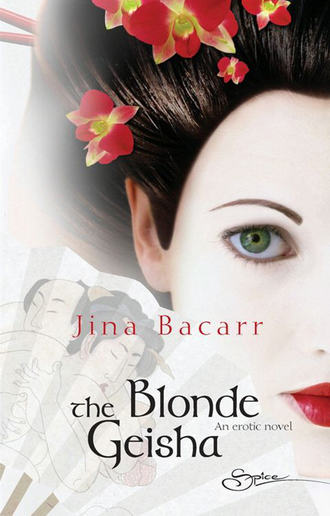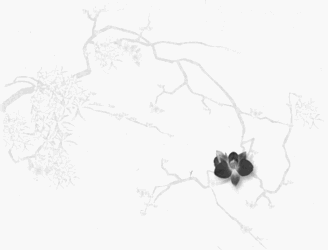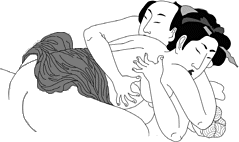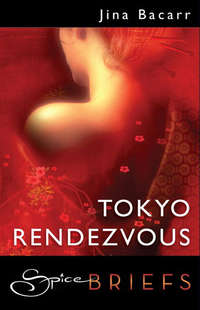
Полная версия
The Blonde Geisha


Jina Bacarr
The Blonde Geisha

To my husband, Len LaBrae,
fellow adventurer and lover.
ACKNOWLEDGMENTS
I want to thank my wonderful editor Susan Pezzack,
who brought out the best in my manuscript with her astute
observations, Leslie Wainger, the editor who started it all with
one phone call, and Roberta Brown, my friend and agent and
I’m sure in another lifetime, my geisha sister.

The early summer of 1892 brought a heavy rainy season that year in Japan. Plum rain, the Japanese call it, because it comes when the fruit bulges with ripeness and promise. Like a young girl reaching womanhood.
A girl like me.
The air was warm and damp, but as in all things Japanese, a uniqueness about the rain awakened my senses and stirred my desires. I was struggling with grief while a wild joy surged within me, a sensual discovery of my changing body that filled me with concupiscence. An unsettling combination of emotions for any young girl. I yearned to yield to my desires, to awaken my female soul, to love, and be loved.
I was fifteen years old.
And I wanted to be a geisha.
I so admired the spirit of these women, their daring and their beauty. They were purveyors of dreams and lived in a fairy-tale world of misty romance. Every day on my way to missionary school, I’d stare at the young apprentice geisha, scurrying along the street on their high sandals with a small bell fixed inside, their white-painted faces peeking out from under their pink paper parasols.
At night en route to the Kabuki theater with my father, I ogled the geisha riding in a jinrikisha, wearing their formal black kimono embroidered with flowers and birds. On late afternoons, I giggled when I passed by the okâsan, mama-san, sitting on her polished veranda and smoking her ivory pipe.
Filled with inspiration, shaking more with anticipation than with fear, I felt compelled, driven, to follow my desire to enter into this ever-fascinating—sexually liberated—world of geisha. I wanted to know how this world of flowers and willows coexisted in a land where girl babies were put upon the cold ground for the first three days after they were born so they may know their place in society.
Under men.
I didn’t understand why the women in this land of shoguns and samurai kept their eyes lowered, their hearts hidden, their tears to themselves. Polka-dotted tears on a hard, wooden pillow. As durable as their souls, if they were to survive.
If they were to prosper.
If they were to love.
I was so impressionable, so hungry to indulge in my erotic fantasies, if I didn’t find a way to release my pent-up emotions, I was convinced I would spend the rest of my life concealing the sensuality hidden within me. Instead, I prayed to the gods I’d find the courage to embrace my sexual desires and release my soul from this anguish.
I hadn’t yet tasted the sweetness of a man’s caress nor experienced the torment of lost love. My young breasts were budding with the ripeness of hard red cherries, my hips slim like a boy’s. I could only guess what sense of discovery awaited me in a land where pleasure was a woman’s misfortune. And duty was her only pleasure.
Or so it appeared.
It wasn’t always true.
According to Japanese folklore, the women in the geisha quarters possessed a secret, a mystique so closely guarded for more than two hundred years, they shared it with no one but their geisha sisters. Secrets to keep their skin forever young. Potions to make men fall madly in love with them. Strange toys to bring wave after wave of sexual enjoyment to them and their lovers.
Motivated by this vivid tale, I sneaked down to the geisha quarters of Shinbashi where I could hear their laughter and their restless sighs coming from inside the high walls surrounding the geisha house. I imagined what earthly delights lasted throughout the night. Could I, an outsider, penetrate their mask of civility and learn their exquisite ways to pleasure a man?
Or to pleasure myself?
Could I?
Through the strange workings of the gods that brought much grief and anguish to my young self, I had the opportunity to enter the geisha house that summer. Although I had hair long and golden like bursts of sunbeams exploding into the dawn, and eyes as green and rich as the silk brocade lining of a merchant’s coat, I became a maiko, apprentice geisha, in Kyoto. After three years of training, like the slow unfurling of the rose-pink lotus blossom, I became a geisha.
So many years later, I have reached an age when I can break my silence without violating the geisha code of secrecy. I can share with the outside world my life in the geisha house, the beauty and grace, the sexual and erotic fantasies, and the hidden secrets.
As I sit here in the garden of the teahouse with the butterflies settling on my shoulders and the chime of the wind-bells in my ears, I will write it all down as I remember it on the finest rice paper as translucent as the wings of a moth and dusted with silver and gold: the men I’ve loved, the geisha sister who risked her life for me, the mama-san who reared me as a daughter; their touch, their laughter and their most intimate moments.
And now, as I take into my hand the brush and dip it into the ink, I will tell you the extraordinary and sensual story of the blond geisha.
Kathlene Mallory
—Kyoto, Japan 1931
PART ONE
KATHLENE, 1892
I remember the first time I saw the lights in the geisha quarter of Gion, all pale and yellow, like the moon overhead. Red lanterns with black Japanese characters swayed back and forth in the evening breeze, beckoning me into the teahouse. But it was the sound of the Gion bell ringing in the distance I remember most, making me wonder if everything in life was fleeting. Even love.
—Diary of an American girl in Kioto, 1892

1
Kioto, Japan 1892
I couldn’t tell anyone, not even the gods, but I was scared…really scared. Even before I got to the nunnery, I knew I had to escape. Though I respected the nuns for their piety and servitude, I wanted to be a geisha. Had to be. Didn’t nuns shave their heads and their eyebrows, making their eyes bulge big and unnatural in their faces? I held on to my long hair, vowing never to let them cut it. Even more disturbing, nuns wore plain white kimonos. White was the color of death. Why was my father taking me to a nunnery? Why?
Was I being punished?
I didn’t do anything wrong. Stroking myself until I found pleasure wasn’t wrong, though I was often overcome with a rising desire, a hunger that threatened to explode within me. I wanted to love and be loved. Until then, I had so much sexual energy I had to do something to release it.
But not in a nunnery.
I can’t go. Please.
The world of flowers and willows is my destiny, I wanted to tell my father, no other. Didn’t the geisha possess the high qualities of heart and spirit? Didn’t they inherit a compelling destiny? Didn’t Father say I was uprooted from my homeland like a beautiful flower replanted in uncertain soil? Didn’t a geisha also leave her home to find her destiny?
But it was not to be.
“Don’t dawdle, Kathlene!” my father whispered harshly in my ear, pulling me through the railroad station, my small suitcase banging hard against my thigh. It hurt, but I didn’t complain. I’d have a bruise on my leg by morning, but it wouldn’t show through my white stockings.
Morning. Where would I be then? Why were we here now? What happened to my peaceful world? The girls’ school in Tokio run by the Women’s Foreign Missionary.
What happened?
Rain pelted me in the face. I had no time to anguish over what lay ahead of me. I noticed the lack of noise and scurrying all about me, as if everyone had disappeared in the mist. That was strange. Rain never stopped the Japanese from moving about the city as quickly as hungry little mice, seeing everything, nibbling at everything. They never thought of rainy days as bad-weather days, but rather a blessing from the gods because the rain kept their rice baskets full.
As I plodded through the empty train station with my pointy shoes pinching my toes, wishing I were wearing my favorite clogs, with the little bells, the ones my father bought for me in Osaka, my entire body throbbed with the slow, steady beat of the ceremonial drum. No, it was more like a sexual lightning that struck me at the oddest moments. Since I’d reached my fifteenth birthday, more and more often the hint of such pleasures came to me. When I bathed in the large cypress tub, I wiggled with delight when the warm water, smelling of citron and tangerine, swam in and around my vaginal area, teasing me with tiny sparks of pleasure.
And at night when I lay naked in my futon, the smooth silk lining rubbed against the opening between my legs, making me moist. I wished for a man who would fill me up inside so deeply the wave of pleasure would never end. I dreamed of the day I’d feel the strength of a man’s arms around me, his muscles bulging, his hands squeezing my breasts and rubbing my nipples with the tips of his fingers. I smiled. I had the feeling the nuns would frown upon me thinking such delicious, sexy thoughts.
I asked, “Where is this nunnery, Father?”
“At Jakkôin Temple, not far from here.”
It isn’t far enough.
“Why did we leave Tokio in such a hurry?”
“Don’t ask me so many questions, Kathlene,” Father said, popping up his large, black umbrella to keep the rain off us. “We’re not out of danger yet.”
“Danger?” I whispered in a soft voice, though I was certain my father heard me.
“Yes, my daughter. I couldn’t tell you this before, but I’ve made a powerful enemy in Japan who wishes me great harm.”
“Why would someone wish to harm you?”
I played with the torn finger on my glove, ripping it. I couldn’t help it. I was worried about my father, terribly worried. A gnawing ache told me something worse than going to a nunnery had taken place.
“If you must know, Kathlene, a great tragedy has occurred,” my father said, his voice muffled by the rain. His harsh words shot through me, making me hear the pain in his voice.
I dared to ask, “What do you mean?”
“A man has lost what is most dear to him and he believes I’ve taken it from him.” My father looked around the railroad station, his eyes darting into every corner. “That’s all I can tell you.”
“What could you have done—”
“Don’t speak about what doesn’t concern you, Kathlene. Something you’re too young to understand,” my father said, never looking at me, only at some hidden enemy I couldn’t see. He held my hand so tightly my bones felt as if they would break.
“You’re hurting me, Father. Please…” My eyes filled with tears. Not from the pain, but from the fear for my father’s safety, making my heart race.
“I’m sorry, Kathlene,” he said, loosening his grip. “I didn’t mean to hurt you.”
“I know,” I said in a quiet voice, but the pain in my heart remained.
Father continued to look everywhere, then, satisfied the platform was empty except for the old stationmaster on duty at the wicket, he kept walking. Faster now.
I forced myself to put a skip into my step as I struggled to keep up with my father’s long strides. He’d barely spoken to me on the long train trip from Tokio. His head turned right then left, checking to make certain I was at his side. Even now, he dragged me behind him, wet, hungry and tired. He continued to hold on to me tightly, so tightly, as if he feared he’d lose me. He grunted like an unhappy samurai, his head bowed low so no one would see his face.
That was so unlike my father. Edward Mallory was a giant of a man, towering over everyone. He had a booming voice that carried fast and far. Here, voices were as soft as stockinged feet scurrying across wooden floors so sensitive they creaked if a nightingale landed upon them.
My father was also pigheaded, stern, and he didn’t understand me. How could he? I didn’t see him as often as I wished. He worked for an American bank, he was proud to tell anyone who asked, investing the bank’s money in this new land. The English had built the first railway and my father had to work hard to keep up with the competition. Every day more overseas banks were opening up branches, so he told me, and investing in the railway system spreading out over the island. He was often gone for days, meeting with officials from the Japanese government and ruling families, and drinking cup after cup of foaming green tea. Sometimes, he drank the tea with me. It tickled my mouth and made me giggle. Not my father. I doubted he ever laughed at anything.
“Stay close behind me, Kathlene,” Father ordered, his voice stern. “The Prince has his devils everywhere.”
“The Prince?” My curiosity was piqued. I’d heard my father had many meetings with the foreign minister and other dignitaries, but a prince? My heart quickened, my eyes glowed, then dimmed when I felt my father’s body stiffen, his hand go rigid around the umbrella.
“Forget what I said about the Prince, Kathlene. The less you know, the better.”
I had no time to wonder what he was talking about. My stomach jumped when I saw a young man pulling a jinrikisha, racing out of the shiny blackness of a narrow street.
My father looked pleased, very pleased, to see him.
So was I.
Instead of wearing the cloak made of oiled paper the jinrikisha drivers wore in the rain, he was nearly nude, exposing his sinewy bronze flesh in the most delectable manner, as if he enjoyed showing off his muscular body to the rain goddesses. I imagined being a raindrop and landing upon his lips and tasting the sweetness of his kiss. I giggled. Kissing was very naughty to the Japanese, an intimacy they rarely exchanged, though I was eager to discover its pleasures.
I eyed the bulging muscles on the boy’s arms, naked and pleasing to my eye, as were his powerful-looking legs. He ran barefoot with only a bit of rag tied around his big toe. What intrigued me most was the swath of dark blue cotton he wore around his torso. I giggled. It wasn’t much bigger than the bit of rag.
Most days, the station was filled with jinrikisha boys waiting for passengers, Father told me, noticing my avid interest in the young man. They were well-informed runners who knew what stranger arrived when, whose house you were passing, what plays were coming out, even when the cherry blossoms would unfold. The station was empty today except for this boy, the only one brave enough to run in the rain.
He stopped in front of us and bowed low.
Dusty, bare-legged coolies, I often heard the English ladies call the jinrikisha drivers. How could that be? Not this boy. I closed my eyes, letting my mind drift through a whispering darkness. An irresistible urge rose up in me that made me yearn for something, something, but I couldn’t grab on to it. As if an invisible spirit with cool fingers dropped icy dewdrops upon my naked belly and made me squirm with delight.
I opened my eyes. I couldn’t contain my curiosity about the young man who pulled the big two-wheeled baby carriage. I craned my neck to see him better, but his face was hidden from me by a low-brim straw hat. No matter. I knew in my heart he was handsome.
A bigger surprise awaited me. Without a word my father hustled me into the black-hooded conveyance. I drew in my breath, somewhat in awe. Excitement raced through me. Only geisha were allowed to ride in jinrikishas. I swore I could smell the scent of the camellia nut oil from their hair lingering on the seats.
Closing my eyes and resting my head against the seat, I imagined I was a beautiful geisha. What would I do if I found a handsome young man when my frenzied sensations were at a peak, my face flushed, my breasts swollen, my nipples hard, my throat dry?
Would I lie down, raise my legs up as my lover kneels between my thighs, his hands on the straw mat?
Or would he lie on his back and stretch his legs straight as I straddle his body, my knees to his sides?
I inhaled the fresh smell of rain in the air. I found such thoughts so romantic and amusing, but I lost my smile and kept my eyes straight ahead when I saw my father staring at me.
“I’m troubled, Kathlene. Something is amiss. There’s no one here from the temple to greet us.” He rubbed his chin, thinking, then: “I have no choice but to trust this boy to take us to our destination.”
“I trust him, too, Father.” I grinned when the jinrikisha boy turned around and lifted up his head from under the flat straw plate of a hat he wore and smiled at me. I lay back on the seat, relieved. He wasn’t much older than I was. And he was handsome.
Surely my father couldn’t keep me hidden away in a nunnery forever, without a chance to see anyone? Nevertheless, these irrational fears chilled me, flowed through me, and crawled up and down my skin like tiny golden-green beetles. Cold perspiration ran down my neck.
How was I going to become a geisha if I was shut away in a nunnery? Nuns were kept out of sight from visitors and spent their time in meditation and arranging flowers, not in ogling the muscles of jinrikisha boys. As if the gods decided to remind me I had no choice, thunder rolled overhead. A downpour was on the way.
I heard my father give the boy instructions where to take us, the boy nodding his head up and down. He bowed low before raising up the adjustable hood of steaming oilcloth covering us. A canvas canopy arched over the seat to protect us from the rain.
“Hurry, hurry!” Father shouted with urgency to the driver, then he sat back in the two-seat, black-lacquered conveyance.
The boy grunted as he lifted up the shafts, got into them, gave the vehicle a good tilt backward and took off in a fast trot.
I had no time to ponder my fate as the boy snapped into action and pulled the jinrikisha down a street so narrow two persons couldn’t pass each other with raised umbrellas. I thought it unusual the boy didn’t shout at the few passersby to get out of our way as most drivers did. Instead, he ran in silence, his heavy breaths pleasing to my ears. I kept trying to see his face, but every time I peeped out of the tiny curtain, my father yanked me back inside the jinrikisha.
“Keep your mind on our mission, Kathlene.”
“I’m trying my best, Father, but you’re not telling me everything,” I dared to blurt out. Worry for his safety made me anxious.
“I can’t. All you have to know is you’re my daughter and you’ll act accordingly.”
Angry, I crossed my legs, my black button boots melting into the softness of the floor mat. I wiggled about on the red velvet-covered seat, trying to get comfortable in my wet clothes and sinking down lower into the soft cushion. I didn’t mean to be disrespectful to my father, but I was frightened. Frightened of what lay ahead.
I looked over at him and went over in my mind the events of the past day and night, trying to understand why he’d ordered me to pack my things because we were leaving Tokio at once. Next he ordered our housekeeper, Ogi-san, to pack rice, pickled radishes and tiny strips of raw fish into lunch boxes so we’d have something to eat on the day-long journey ahead of us.
He’d hardly spoken a word to me since we left. I wished he would confide in me, as he often did. This time he said nothing. Instead, he ordered me to speak to no one.
“My life depends on it, Kathlene,” he told me, putting his right hand under his jacket, as if he hid a pistol there.
My father was a handsome man, but at this moment he looked funny, strange even, bent over in the tiny jinrikisha. His clean-shaven face was wet with rain, his head hatless, his hair matted. His rich, black overcoat glistened with dewy pearls of raindrops. Even his black leather gloves shone with a rainy sparkle that played with my imagination, hypnotizing me into believing this whole escapade was a game. That nothing was wrong.
For what could go wrong in this beautiful, vibrant green land of misty plum blossoms? Lyric bells played a song on every breeze and the sweep of brilliant red maple leaves harmonized with the melody.
To me, it was a gentle land inhabited by a gentle people. And the only home I’d known since my father brought me to Japan with my mother when I was a small child. He’d known my mother was sickly and the ocean voyage from San Francisco had weakened her, but Mother wouldn’t stay behind without him.
So she came. With me. My heart ached with fresh tears, trying to remember my mother. It was difficult for me. She died that first year. I never shared my pain with anyone. Especially my father. He seemed to hold back his feelings around me, yet I knew he loved me. That was why I didn’t understand why he acted so strangely.
What have you done, Papa? I longed to ask him, but I didn’t. I never called him “Papa” to his face. It was a term he didn’t understand. He was my father. No more. No less.
I held on to the seat as the thin, rubber-treaded wheels of the jinrikisha bounced over what must be a small bridge. I couldn’t resist peeking out the curtain again, but this time my father didn’t pull me back. I sighed, delightful surprise catching on my breath. Though it was near sunset, I marveled at the western hills throwing purple-plum shadows on their own slopes, the long stretch of wheat fields turning to a lake of pure gold by the drenching rain.
A splatter of rain hit my nose and I wiped it off, muttering in half Japanese and half English. I switched easily between the two languages, since I’d learned both at the same time. Japan had been my home for most of my life and I was proud of my linguistic ability. Though with my blond hair, I often felt strange in this land of dark-haired women. My father assured me I was going to be as pretty as my mother, though he knew nothing about my desire to become a geisha. I smiled. I know Mother would have approved. Geisha were admired by everyone. They were the most beautiful women: the way they walked, their style and their spirit.
I sighed again, letting out my frustration in one big puff of air. I’d never be a geisha if I stayed in a nunnery. I’d be doomed to a life of joyless obedience, days praying and nights filled with loneliness. The beauty and brightness of the world of flowers and willows promised so much more. For now, my dream to be a geisha was only that. A dream.
We’d been riding for an hour, maybe longer, and the green shadow and gloom hung lower in the sky. I could hear the cawing of the ravens living in the old pine trees as if it were a solemn chant welcoming me to my new home.








